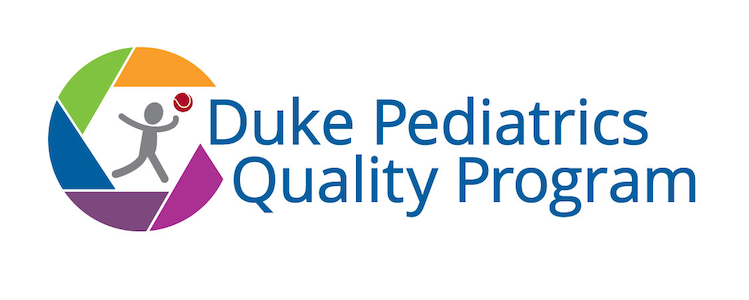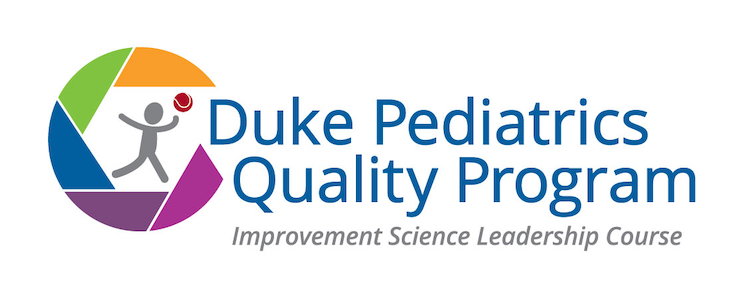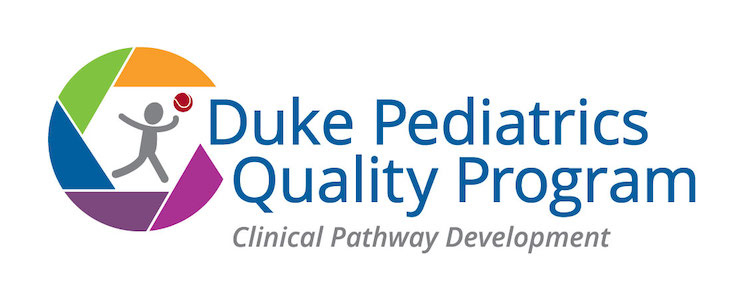
We believe that caring for children is a both a privilege and a great responsibility. The Duke Department of Pediatrics is committed to providing the best possible care to every patient and family, and raising the bar for the quality of pediatric health care across the country.

Our vision is to advance the health of children by achieving the quadruple aim of better outcomes, improved clinician experience, lower cost, and improved patient experience.
Our work focuses on improving:
- Patient and family-centered care
- Health equity outcomes
- Efficiency of care
- Application of research & evidence-based care
- Multidisciplinary collaboration and teamwork
- Use of structured methodologies and data-driven approaches
- Capability of faculty, trainees, and staff to use improvement science methods
- Employee satisfaction and workforce development
- Alignment with institutional goals and programs
Our American Board of Pediatrics (ABP) Portfolio Sponsor program is designed to reduce the quality improvement (QI) project application burden for eligible pediatricians seeking MOC credit for their work.

Introduction to Quality Improvement
This interactive, web-based module introduces key concepts and tools used in health care quality improvement.
Improvement Science Leadership Course (ISLC)
The ISLC, sponsored by the Department of Pediatrics, is a nine-month program that aims to develop faculty with intermediate competency in improvement science methods to execute academic healthcare quality improvement and lead improvement teams.
View the ISLC Impact Report 2019-2024
About the ISLC (NetID required)

Our Pediatric Clinical Pathways program incorporates evidence-based research, best practice, and local expert consensus into standardized pathways for use by clinical teams at the point of care to facilitate the delivery of high-quality medical care.
Duke Children’s Infant Fever Pathway example
More about Pediatric Clinical Pathways (NetID required)

2023 Quality & Safety Conference
This annual conference celebrates work in quality improvement, safety, and teamwork across the Duke University Health System. Every year, our department joins hundreds of Duke Health employees to recognize, evaluate, learn, and advance health together.
Duke faculty and staff: Visit our intranet to see publications and videos from the conference (NetID required)
Duke Pediatrics Safe Sleep Task Force
The Duke Safe Sleep Task Force, established in 2019, is a multidisciplinary team of physicians and nurses from all pediatric units at Duke University Hospital (DUH). Led by co-chairs Sophie Shaikh, MD, and Kristina Nazareth-Pidgeon, MD, the program focuses on promoting safe sleep for patients under 1 year old. In addition to implementing a safe sleep policy, the task force prioritizes staff and parental education.
Recent publications
Shaikh S, Chamberlain L, Nazareth-Pidgeon K, Boggan J. Quality improvement initiative to improve infant safe sleep practices in the newborn nursery. BMJ Open Quality. 2022;11. e001834. 10.1136/bmjoq-2022-001834.
Nazareth-Pidgeon KM, Chamberlain L, Shaikh SK. Improving infant safe sleep practices in the newborn nursery. Pediatrics. February 2022;149(1 Meeting Abstracts February 2022):553.
News articles

Emily Sterrett, MD (and other members of her team part of a Duke Institute for Health Innovation award), participated in a two-part “Tradeoffs” podcast, “Rooting out Health Care Bias in AI.”
Duke University Health System participates in many national and state performance measure programs to help us improve our care and help our patients and families make informed choices about their care. Our ongoing quality assurance efforts ensure compliance with Centers for Medicare & Medicaid Services and Joint Commission standards.
Explore descriptions and links to these programs below.
The Joint Commission
The Joint Commission (TJC) is an independent, not-for-profit organization that evaluates and accredits more than 15,000 health care organizations and programs in the United States.
All Duke University Health System entities are accredited by the TJC. The data available from TJC on quality and safety are collected through on-site inspections and from the patients' medical records.
Leapfrog
Leapfrog is a program driven by employer groups and other purchasers of health care. Leapfrog reports on four areas of quality and safety: computerized physician order entry, evidence-based hospital referrals, high-risk treatments, and safe practices.
Healthgrades
Healthgrades gathers information on hospitals and physicians to provide quality ratings for common procedures and treatments.
